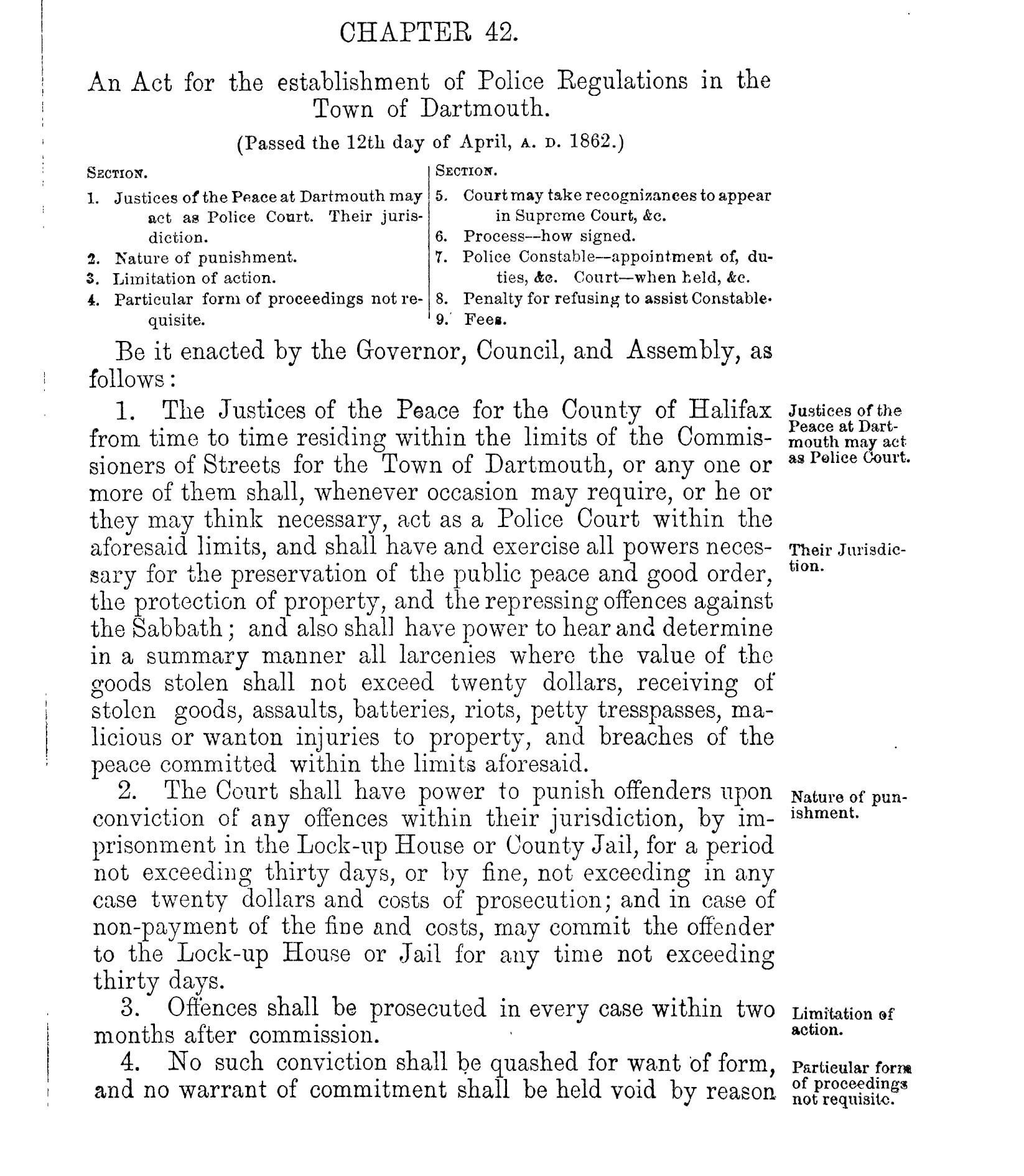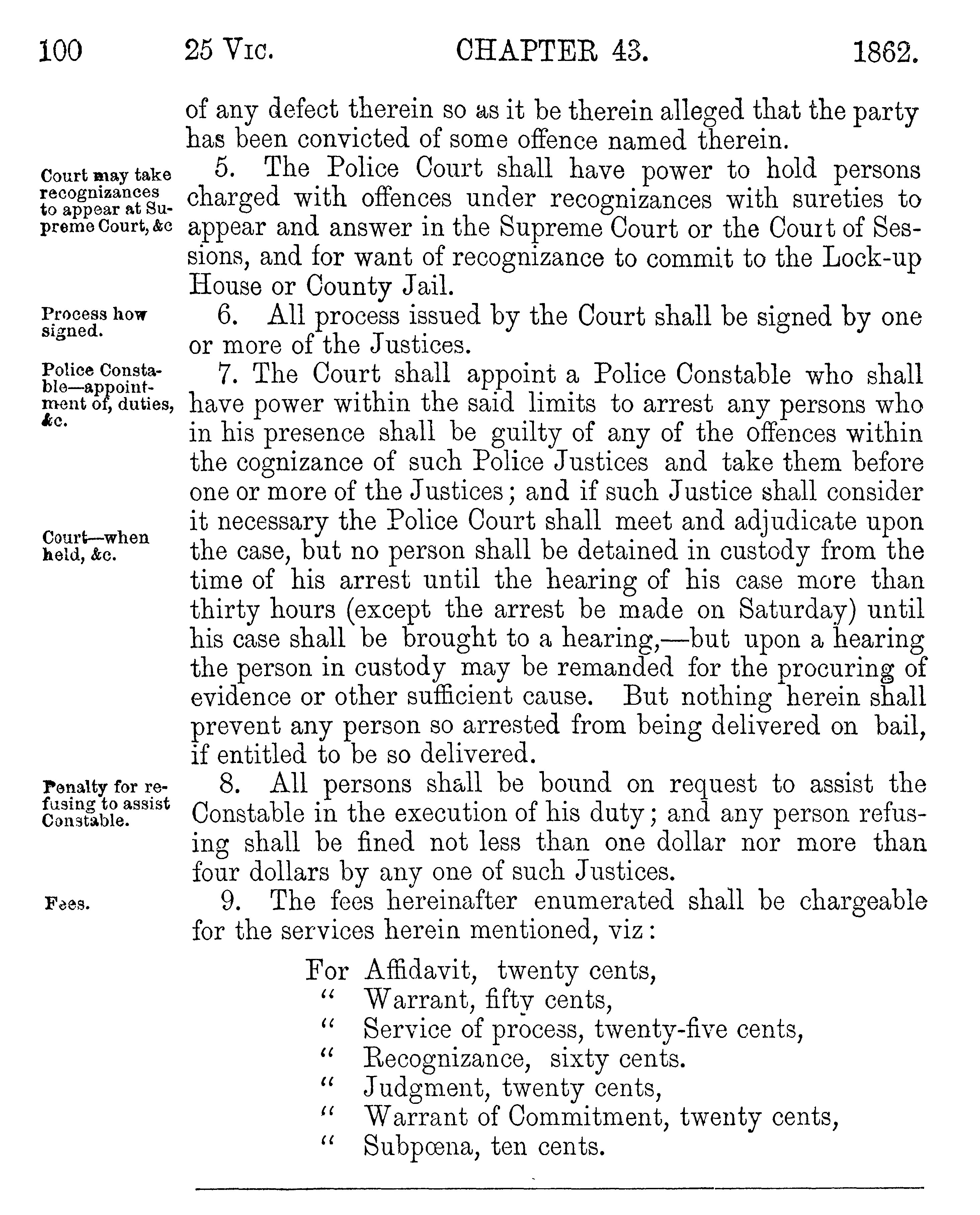

An Act for the establishment of Police Regulations in the Town of Dartmouth.
(Passed the 12th day of April, A. D. 1862.)
SECTION.
1. Justices of the Peace at Dartmouth may act as Police Court. Their jurisdiction.
2. Nature of punishment.
3. Limitation of action.
4. Particular form of proceedings not requisite
5. Court may take recognizances to appear in Supreme Court, &c.
6. Process – how signed.
7. Police Constable – appointment of, duties, &c. Court – when held, &c.
8. Penalty for refusing to assist Constable
9. Fees.
Be it enacted by the Governor, Council, and Assembly, as follows:
Justices of the Peace at Dartmouth may act as Police Court, Their Jurisdiction:
1. The Justices of the Peace for the County of Halifax Justices from time to time residing within the limits of the Commissioners of Streets for the Town of Dartmouth, or any one or more of them shall, whenever occasion may require, or he or they may think necessary, act as a Police Court within the aforesaid limits, and shall have and exercise all powers necessary for the preservation of the public peace and good order, the protection of property, and the repressing offences against the Sabbath ; and also shall have power to hear and determine in a summary manner all larcenies where the value of the goods stolen shall not exceed twenty dollars, receiving of stolen goods, assaults, batteries, riots, petty tresspasses, malicious or wanton injuries to property, and breaches of the peace committed within the limits aforesaid.
Nature of punishment:
2. The Court shall have power to punish offenders upon conviction of any offences within their jurisdiction, by imprisonment in the Lock-up House or County Jail, for a period not exceeding thirty days, or by fine, not exceeding in any case twenty dollars and costs of prosecution; and in case of non-payment of the fine and costs, may commit the offender to the Lock-up House or Jail for any time not exceeding thirty days.
Limitation of action:
3. Offences shall be prosecuted in every case within two months after commission.
Particular form of proceedings not requisite:
4. No such conviction shall be quashed for want of form, and no warrant of commitment shall be held void by reason of any defect therein so as it be therein alleged that the party has been convicted of some offence named therein.
Court may take recognizances to appear at Supreme Court, &c:
5. The Police Court shall have power to hold persons recognizances charged with offences under recognizances with sureties to appear and answer in the Supreme Court or the Court of Sessions, and for want of recognizance to commit to the Lock-up House or County Jail.
Process how signed:
6. All process issued by the Court shall be signed by one signed by one or more of the Justices.
Public Constable-appointment of, duties, &c.
7. The Court shall appoint a Police Constable who shall have power within the said limits to arrest any persons who in his presence shall be guilty of any of the offences within the cognizance of such Police Justices and take them before one or more of the Justices; and if such Justice shall consider it necessary the Police Court shall meet and adjudicate upon held, &c. the case, but no person shall be detained in custody from the time of his arrest until the hearing of his case more than thirty hours (except the arrest be made on Saturday) until his case shall be brought to a hearing,—but upon a hearing the person in custody may be remanded for the procuring of evidence or other sufficient cause. But nothing herein shall prevent any person so arrested from being delivered on bail, if entitled to be so delivered.
Penalty for refusing to assist Constable:
8. All persons shall be bound on request to assist the Constable in the execution of his duty; and any person refusing shall be fined not less than one dollar nor more than four dollars by any one of such Justices.
Fees
9. The fees hereinafter enumerated shall be chargeable for the services herein mentioned, viz:
For Affidavit, twenty cents,
” Warrant, fifty cents,
” Service of process, twenty-five cents,
” Recognizance, sixty cents.
” Judgment, twenty cents,
” Warrant of Commitment, twenty cents,
” Subpoena, ten cents.
“For the establishment of Police Regulations in the Town of Dartmouth”, 1862 c42
